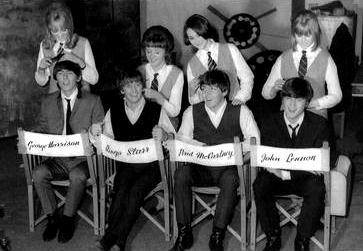 NIGHT FEVER
NIGHT FEVER
The film A Hard Day's Night was flung together and was United Artists' attempt to cash in on a phenomenon which they thought would be short lived, Sir George Martin says.
How wrong they were.
Just like the famous 1962 lament from a Decca Records executive to Beatles manager Brian Epstein that "guitar bands are on their way out", United Artists had badly underestimated John, Paul, George and Ringo.
"They never thought we would be talking about it nearly 40 years later," says Martin, 75, the legendary Beatles producer, of the 1964 Richard Lester film.
Costing less than £300,000 and filmed in black and white to keep the costs down , A Hard Day's Night is an oddball, day in the life comedy written by fellow Liverpudlian Alun Owen.
Martin, who was nominated for an Academy Award for musical direction of its soundtrack, believes the film captures some of the Beatlemania mayhem he experienced first-hand when he followed the boys on one of their US tours.
"I went around with them in New York, Washington and Florida. I saw some of their lives at that time and I realised what a terrible goldfish bowl they lived in," he recalls.
"They were enormous prisoners of their fame and I wouldn't have exchanged places with any of them."
A man with classical training, a penchant for jazz and a weakness for loony humour (he produced comedy records for Goons Peter Sellers and Spike Milligan), Martin quickly became a fan of his young charges.
"When I first met them they had this charisma and it came over enormously in all their concerts and I remember in Washington standing up cheering like everybody else."
"There was a little boy sitting next to me and he was amazed at this very old man - I must have been all of 38 - jumping up and down and he said to me: 'Excuse me sir, you like the Beatles?'"
"I said 'I certainly do'. He said: 'Yeah, aren't they great!' and he was obviously amazed that I would like them too."
Although they had tremendous raw talent, the Beatles increasingly needed Martin to arrange (and sometimes augment) their songs when they started straying from the standard bass, drums and guitar make-up of their songs.
Paul McCartney's "Yesterday" recording was a classic example.
""Yesterday" was really a solo recording and it was also the first time that we'd ever used any instruments other than the four Beatles and myself; in other words, I brought in string quartet," Martin remembers.
McCartney spied the score Martin had written for the musicians.
"It had on top "Yesterday" and on the bottom it had the usual things I'd put on the score and he said: 'You haven't got my name on it!' I said: 'Well it doesn't matter, it's only a piece of paper'."
"He then picked up my pencil and wrote underneath "Yesterday": 'By Paul McCartney, John Lennon, George Martin Esquire and Mozart'. I still have that piece of paper at home."
So did he think he should have been given a song writing credit for some of his work on the Lennon-McCartney songs?
"No, not really. I think my job as a producer was the right one. I did write some of the stuff but not the songs themselves."
"I wrote part of the arrangements and, for example, "In My Life", the little harpsichord bit in the middle is completely mine. That's not part of the song."
"You can sing the song without that and so no, they were perfectly right in what they did."
Despite his long assocaition and close friendship with the three surviving Beatles, Martin was not asked to produce the reworked John Lennon songs - "Free As A Bird" (1995) and "Real Love" (1996) - for the autobiographical Anthology series.
There were rumours his poor hearing had ruled him out ("it's a combination of being very old, which I am, and also listening to too loud sounds for too long a time when I was younger") but he didn't mind that ELO's Jeff Lynne got the gig.
"I was quite glad I didn't really because I was a bit uncomfortable about using John's dead voice."
"It was very difficult to do for them because the demo that John had was heavily oriented in favour of the piano. It was just voice and piano all on one track, very difficult to separate one from the other. They just covered it with a mass of sound."
Memories of Lennon's death at the hands of a confused assassin in December 1980 still play on Martin's mind.
"I was in bed in my home in the country and I was due to go to London because I was working that week with McCartney on Tug Of War and the phone rang at six o'clock in the morning," he says.
"An American voice said: 'Is that George Martin? Tell me, how do you feel about John's death?' and I said: 'What?' 'John's been shot. First thing this morning. What do you think about it?'"
"That was what woke me up that day. I came straight out of dreaming into this silly voice and I didn't know until later that my replies and his questions were being broadcast live."
To Martin, no rock band has ever managed the consistent brilliance of the Beatles.
"I don't listen to a great deal of what's being produced today because I don't enjoy it very much."
"There's no way you would get me listening to anything by Eminem or any of those characters because it really is rubbish compared with what we used to do."